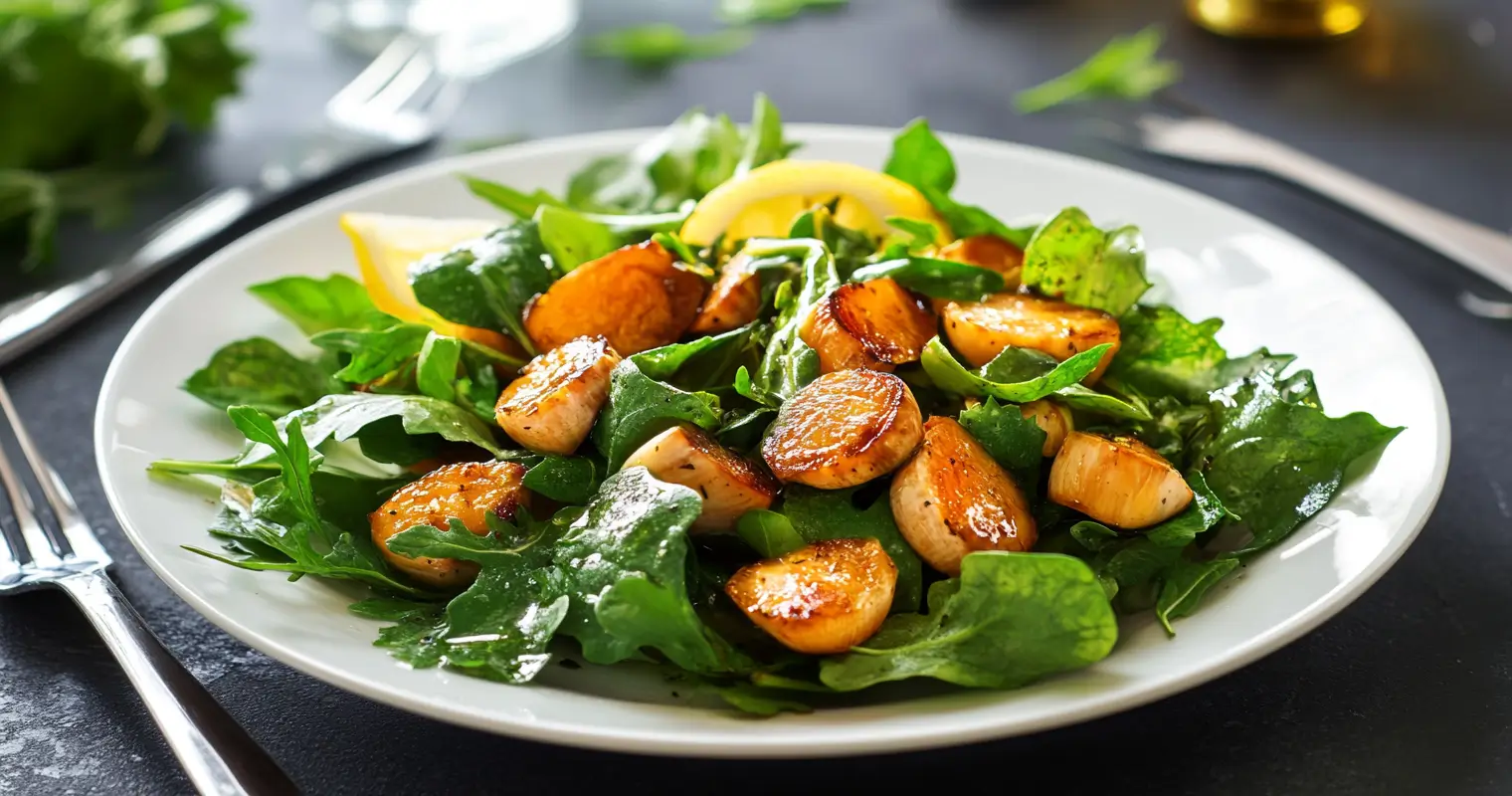The Best Fluffy Pancakes recipe you will fall in love with. Full of tips and tricks to help you make the best pancakes.


Let’s talk about a vegetable that doesn’t get nearly enough spotlight: sunchokes. Ever heard of them? If not, you’re in for a treat. These knobby, unassuming root veggies are like hidden gems in the culinary world. Not only do they taste fantastic, but they also pack a serious punch when it comes to health benefits. So, let’s dive into what makes sunchokes so special.
Introduction to Sunchokes
Let’s talk about a vegetable that doesn’t get nearly enough spotlight. Ever heard of them? These knobby, unassuming root veggies are like hidden gems in the culinary world. Not only do they taste fantastic, but they also pack a serious punch when it comes to health benefits.
What Are They?
Also known as Jerusalem artichokes, these tubers belong to the sunflower family. Despite their resemblance to ginger roots, their flavor is completely different.
- Fun Comparison: Think of them as the quirky cousin of potatoes—healthier, nuttier, and full of surprises.
- Flavor Profile: Raw, they’re crisp and sweet; when cooked, they develop a creamy, nutty character that works beautifully in soups, gratins, and more.
Why Are Sunchokes Called Jerusalem Artichokes?
The name is a bit misleading, as these tubers have nothing to do with Jerusalem or artichokes. Here’s the backstory:
- The “artichoke” nods to their subtle flavor, which resembles the taste of artichoke hearts.
- The “Jerusalem” part comes from a mispronunciation of the Italian word girasole, meaning sunflower (the plant they grow on).
A Brief History and Origin of Sunchokes
Sunchokes are native to North America, where Indigenous peoples first cultivated and used them as food. Though they’ve been around for centuries, they’re only recently gaining popularity in modern cuisine, thanks to their incredible nutritional benefits and unique flavor.
Ingredient Recipes
Sunchokes are incredibly versatile, making them a favorite for chefs and home cooks alike. Here are a few more ways to enjoy them that’ll make you fall in love with their unique flavor.
Sunchoke Salad with Lemon Dressing
- Ingredients: Thinly sliced raw sunchokes, arugula, cherry tomatoes, lemon juice, olive oil, and parmesan shavings.
- Instructions: Toss everything together for a refreshing salad that’s perfect as a light lunch or dinner starter.
Creamy Sunchoke and Potato Gratin
- Ingredients: Sliced sunchokes, potatoes, cream, garlic, and cheese.
- Instructions: Layer the sunchokes and potatoes, pour over the cream mixture, and bake until golden and bubbly. It’s the ultimate comfort food.
Sunchoke Mash: A Low-Calorie Alternative to Mashed Potatoes
- Ingredients: Boiled sunchokes, a splash of milk, and a dollop of butter.
- Instructions: Mash them up for a creamy, delicious side dish that’s lighter than traditional mashed potatoes.
Sunchoke and Carrot Stir-Fry
- Ingredients: Sliced sunchokes, julienned carrots, soy sauce, sesame oil, and garlic.
- Instructions: Toss everything in a hot pan for a quick, healthy, and flavorful stir-fry.
Nutritional Value of Sunchokes
If you’re interested in health and wellness (or just curious about what you’re eating), you’ll love what these tubers offer.
Key Nutrients Found in Sunchokes
Sunchokes are packed with inulin, a type of prebiotic fiber that’s excellent for gut health. They’re also rich in:
- Potassium: Supports heart health and muscle function.
- Iron: Helps maintain healthy blood and energy levels.
- Vitamin C: Boosts immunity and promotes skin health.
And the best part? They’re low in calories—making them perfect for weight management.
How Sunchokes Compare to Other Root Vegetables
Move over, potatoes and carrots—there’s a new contender in town. Sunchokes have a unique nutritional profile:
- Lower in carbs.
- Higher in fiber.
- Versatile in the kitchen.
It’s as if sunchokes combined the best traits of other root vegetables into one delightful package.
Inulin: The Secret Powerhouse in Sunchokes
If sunchokes had a superhero cape, inulin would be the material. This soluble fiber is what makes them a standout in the health world. Inulin works as a prebiotic, feeding the good bacteria in your gut and promoting a healthy microbiome. It also helps regulate blood sugar and keeps you feeling full longer.
“Think of inulin as your gut’s best friend, cheering it on from the sidelines while keeping everything running smoothly.”
Health Benefits of Sunchokes
Boosting Gut Health with Prebiotics
Your gut is like a bustling city of microbes, and sunchokes are the ultimate city planners. Thanks to their high inulin content, they nourish beneficial bacteria, helping your digestive system thrive.
Inulin and Its Role in Digestive Health
Inulin works wonders by promoting regularity and reducing bloating. If you’ve ever struggled with digestion issues, adding sunchokes to your diet could be a game-changer. Plus, a happy gut often leads to a stronger immune system—double win!
Sunchokes as a Prebiotic-Rich Food for Your Microbiome
Did you know that the health of your gut bacteria affects everything from your mood to your metabolism? Sunchokes feed these bacteria, making them one of the best prebiotic foods you can eat.
Sunchokes for Weight Management
If you’re trying to shed a few pounds or maintain a healthy weight, sunchokes can be your secret weapon.
Low-Calorie Benefits of Sunchokes
With only about 100 calories per cup, sunchokes are a guilt-free addition to any meal. They’re filling without being heavy, making them perfect for anyone on a calorie-conscious diet.
Fiber’s Role in Curbing Appetite
Fiber is like the unsung hero of the food world. It keeps you feeling full and satisfied, preventing those pesky snack cravings. Sunchokes, with their high fiber content, help you eat less without feeling deprived.
Health Benefits of Sunchokes (Continued)
We’ve already explored how sunchokes are fantastic for gut health and weight management. But wait—there’s more! These root veggies are like nature’s Swiss Army knife, offering a variety of benefits for different aspects of your health.

Blood Sugar Regulation with Sunchokes
If you’re keeping an eye on your blood sugar levels, sunchokes are about to become your new best friend.
How Inulin Helps Manage Glucose Levels
The inulin in sunchokes slows down the digestion and absorption of carbohydrates, which helps prevent blood sugar spikes. Unlike starchy vegetables like potatoes, sunchokes are a safer choice for people with diabetes or those watching their glucose levels.
Why Sunchokes Are Ideal for Diabetic Diets
Because of their low glycemic index, sunchokes don’t cause drastic changes in blood sugar. Adding them to your meals can help you enjoy delicious, satisfying dishes without compromising your health goals.
Anti-Inflammatory Properties of Sunchokes
Got inflammation? Sunchokes might help. Chronic inflammation can lead to various health issues, from joint pain to heart disease. Thankfully, sunchokes contain nutrients that combat this.
Key Nutrients Supporting Reduced Inflammation
Compounds like vitamin C and potassium in sunchokes help reduce oxidative stress, which is a major contributor to inflammation. These nutrients act as tiny firefighters, putting out the flames inside your body.
Comparing Sunchokes to Other Anti-Inflammatory Foods
While turmeric and ginger are well-known anti-inflammatory superstars, sunchokes hold their own in this category. They’re not as flashy but equally effective when incorporated into your diet regularly.
Common Problems and Solutions When Eating Sunchokes
Let’s address the elephant in the room: sunchokes aren’t perfect. Like all good things, they come with their quirks. But don’t worry—we’ve got tips to help you overcome any hiccups.
Bloating and Gas: The Inulin Effect
One of the most common complaints about sunchokes is their tendency to cause bloating and gas. Why? That same inulin fiber that’s great for your gut can be a bit tricky to digest.
How to Cook Sunchokes to Minimize Digestive Issues
Cooking sunchokes can reduce their inulin content, making them easier on your stomach. Roasting or boiling them thoroughly is your best bet. If you’re new to sunchokes, start with small portions to let your body adjust.
Tips for Introducing Sunchokes into Your Diet
Think of it like making a new friend—take it slow. Pair sunchokes with other easily digestible foods, and avoid eating them raw until your digestive system gets used to their unique properties.
Allergic Reactions to Sunchokes: Are They Safe for Everyone?
While rare, some people may experience mild allergic reactions to sunchokes, like itching or stomach discomfort. If you’re trying them for the first time, start small and monitor how your body reacts.
Sunchokes and Oxalates: What You Need to Know
Sunchokes contain a moderate level of oxalates, which can contribute to kidney stone formation in susceptible individuals. If you’re prone to kidney stones, talk to your doctor before adding sunchokes to your diet.
How to Incorporate Sunchokes Into Your Diet

Now that you know the benefits (and a few tricks for managing potential downsides), let’s talk about the fun part: eating them! Sunchokes are incredibly versatile, making them a fantastic addition to all kinds of dishes.
Delicious Sunchoke Recipes to Try
Ready to get cooking? Here are a few ideas to get you started:
Roasted Sunchokes: A Simple and Tasty Option
Slice sunchokes into thin rounds, toss them with olive oil, salt, and your favorite herbs, and roast them in the oven until crispy. They’re like a healthier version of potato chips but with way more flavor. 🍴
Sunchoke Soup: Comfort Food with Health Benefits

Blend cooked sunchokes with broth, garlic, and a splash of cream for a velvety soup that’s perfect for chilly evenings. Add a sprinkle of parsley on top, and voilà—restaurant-quality comfort food.
Sunchoke Chips: A Crunchy, Healthy Snack
Thinly slice sunchokes, bake them until crispy, and enjoy a snack that satisfies your cravings without wrecking your diet. Trust me, you’ll want to keep a stash of these on hand.
“Cooking sunchokes is like unlocking a treasure chest—you never know what flavor gem you’ll discover next.”
Cooking Tips to Maximize Nutritional Value
To get the most out of sunchokes, avoid overcooking them. Steaming or roasting preserves their nutrients better than frying or boiling them to death. Think of them as delicate flowers—they thrive with gentle care.
Pairing Sunchokes with Other Foods for Balanced Meals
Sunchokes pair beautifully with proteins like chicken or fish and go well with leafy greens or other roasted veggies. Try adding them to a grain bowl or salad for a meal that’s as nutritious as it is delicious.
Frequently Asked Questions
Sunchokes, also known as Jerusalem artichokes, are an underrated tuber with a distinct nutty and slightly sweet flavor. They’re versatile in recipes and offer numerous health and environmental benefits, but they come with quirks like potential digestive discomfort due to inulin.
What Does Sunchoke Taste Like?
Imagine combining the nuttiness of a chestnut with the sweetness of an artichoke and the texture of a water chestnut. When raw, sunchokes are crisp, slightly sweet, and refreshing—perfect for salads. When cooked, they take on a creamy, nutty flavor that makes them a versatile ingredient for soups, gratins, and more.
“If potatoes are the reliable sedan of the vegetable world, sunchokes are the sleek sports car—unexpected, exciting, and just plain fun.”
Why Does My Stomach Hurt After Eating Jerusalem Artichoke?
Ah, the infamous “sunchoke side effect.” The culprit is inulin, the fiber that makes sunchokes so beneficial for gut health. However, inulin can also ferment in your gut, causing gas or bloating. To avoid discomfort:
- Start with small servings.
- Cook sunchokes thoroughly.
- Gradually increase your intake over time.
Think of it like training for a marathon—you’ve got to build up to it!
Do Sunchokes Taste Like Potatoes?
Not exactly. While they share a similar starchy vibe, sunchokes have a unique flavor profile. Potatoes are neutral and earthy, while sunchokes are nutty and slightly sweet. They’re similar enough to use as a substitute in recipes but distinct enough to stand out on their own.
Is Sunchoke a Ginger?
Nope! While their knobby appearance might remind you of ginger root, sunchokes and ginger are entirely different. Sunchokes are tubers from the sunflower family, while ginger is a rhizome from a completely different plant family. They don’t taste alike, either—ginger is spicy, while sunchokes are mild and nutty.
Explore More Recipes and Ideas
When discussing the nutritional benefits of sunchokes, you might want to compare them to other versatile vegetables. For example, you could explore the Ultimate Guide to Yukon Gold Potatoes to highlight how sunchokes stack up against this popular variety. Similarly, incorporating sunchokes into recipes is a breeze; their nutty flavor complements dishes just like the ones found in this Sweet Greens for Beginners guide. If you’re planning to roast or mash sunchokes, drawing inspiration from the Ultimate Guide to Blackstone Recipes could offer exciting culinary techniques that elevate their taste and texture.
The Environmental Benefits of Sunchoke Cultivation
Sunchokes aren’t just great for your health—they’re good for the planet, too! These humble tubers are an eco-friendly crop that supports sustainable farming practices.
Sunchokes as a Sustainable Crop
Sunchokes grow like weeds (literally), requiring minimal water, fertilizer, and maintenance. They’re a hardy plant that thrives in poor soil conditions, making them an excellent choice for farmers looking to reduce their environmental footprint.
Tips for Growing Sunchokes at Home
If you’ve got a garden, why not grow your own sunchokes? They’re incredibly easy to cultivate—just plant a tuber, and watch it flourish. Plus, they’re perennials, so you’ll get a harvest year after year without replanting.
“Sunchokes are like the gift that keeps on giving—perfect for eco-conscious gardeners and food lovers alike.”
Final Thoughts on Sunchokes
So, there you have it: the incredible, delicious, and nutritious world of sunchokes. From their gut-boosting prebiotics to their versatility in the kitchen, these tubers deserve a place in your diet. Sure, they’ve got a few quirks (hello, inulin!), but with a little know-how, they’re easy to love.
Why Sunchokes Should Be a Staple in Your Diet
If you’re looking to add more variety and nutrition to your meals, sunchokes are a no-brainer. They’re unique, delicious, and packed with health benefits that rival even the most popular vegetables.
Summarizing the Incredible Health Benefits of Sunchokes
- Support gut health with prebiotics.
- Aid in weight management thanks to their low-calorie, high-fiber content.
- Help regulate blood sugar levels.
- Reduce inflammation with their nutrient-rich profile.
Whether you’re roasting them, blending them into soups, or crunching on sunchoke chips, there’s no wrong way to enjoy this root vegetable.
“Sunchokes are like the hidden gems of the produce aisle—worth discovering, savoring, and sharing with others.”








